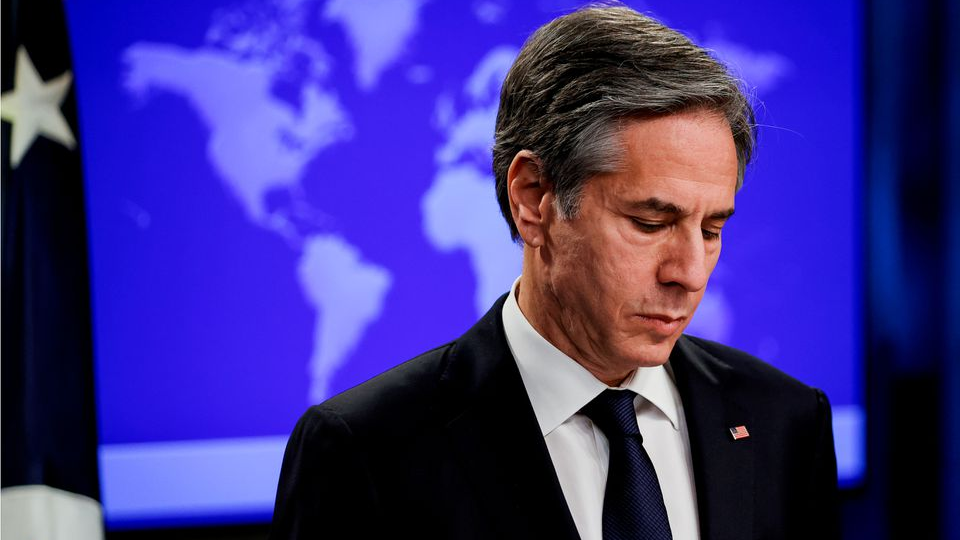
A choice between cooperation and a new Cold War. /CGTN
A choice between cooperation and a new Cold War. /CGTN
Editor's note: CGTN's First Voice provides instant commentary on breaking stories. The daily column clarifies emerging issues and better defines the news agenda, offering a Chinese perspective on the latest global events.
"We are not looking for conflict or a new Cold War. To the contrary, we're determined to avoid both," U.S. Secretary of State Antony Blinken said on Thursday in a long-awaited speech billed as the Biden administration's most comprehensive statement to date on China.
The Biden team understands that any attempt to stymie or clash with the world's second largest economy does no good. The world's most important pair of bilateral ties sank to the lowest level during the Trump administration with tariffs and exchanges of rhetorical threats. At this critical crossroads, Blinken's pledge of not seeking to "block China from its role as a major power, nor to stop China… from growing their economy or advancing the interests of their people" is undeniably "encouraging."
The world's two largest economies, which share extensive common interests, stand to gain from cooperation and lose from confrontation. China maintains a consistent position on enhancing communication and managing differences with the United States, and welcomes Blinken's willingness to cooperate, if he really means to.
However, Washington's determination to avoid a new Cold War comes as Blinken, in the same speech, labeled Beijing as "the most serious long-term challenge to the international order" and Beijing's vision as moving us "away from the universal values that have sustained so much of the world's progress over the past 75 years".
It's an American tradition to use duplicity to obtain geopolitical goals. Blinken, on the one hand, said no to a new Cold War in an attempt to hold the moral high ground, but on the other, continued to tout the "China threat" doctrine. While reaffirming U.S. commitment to China's sovereignty, he criticized China's growing "coercion" on the Taiwan question.
While China welcomes Blinken's determination to avoid a new Cold War, it is hard to say if the U.S. is sincere about it.

U.S. Secretary of State Antony Blinken. /Reuters
U.S. Secretary of State Antony Blinken. /Reuters
Compared with the previous administration, the Biden team is apparently more adept at using "smart" language for political purposes. After all, gaining the moral high ground would make it much easier to shape the public opinion and thus woo more support for future policies.
But while calling for intensified cooperation on a rhetorical level, the U.S., in reality, puts America's interests above others. The Biden administration may approach ties with China with more realism, but it has never forgotten America's long-pursued hegemonic strategy.
This is clearly shown in Blinken's touting the "China threat" doctrine. True, China, as a rising power, is gaining economic, diplomatic, military and technological capabilities. But this poses no threat to universal values. It is only America's influence on other countries and its pursuit of the sole superpower status that could be affected.
Blinken's determination against conflict with China may also be more a result of realistic geopolitical considerations. With the pressure of handling climbing COVID-19 cases, gun violence, inflation and the Ukraine crisis, the Biden administration has few resources left to make an enemy of China. At the same time, China's growing influence means the U.S. would have to make more efforts to check it than in the past.
Prior to Blinken's China speech, Biden's Asia trip, the main purpose of which was to sell Washington's Indo-Pacific Economic Framework for Prosperity (IPEF), did not reap the desired results. There is suspicion about the IPEF, a framework designed to isolate China, among the countries in the region.
"ASEAN countries are in no mood to decouple from China and the existing pattern of supply chain division has lasted a long time and has brought benefits to the countries of the Indo-Pacific," India's former diplomat M. K. Bhadrakumar wrote on The Citizen, an online news daily.
In this context, launching a new conflict with China is the least wise thing the Biden administration can do. China welcomes Blinken's words on "cooperation." But how will the U.S. act in reality? Will it walk its talk?
(If you want to contribute and have specific expertise, please contact us at opinions@cgtn.com. Follow @thouse_opinions on Twitter to discover the latest commentaries in the CGTN Opinion Section.)

